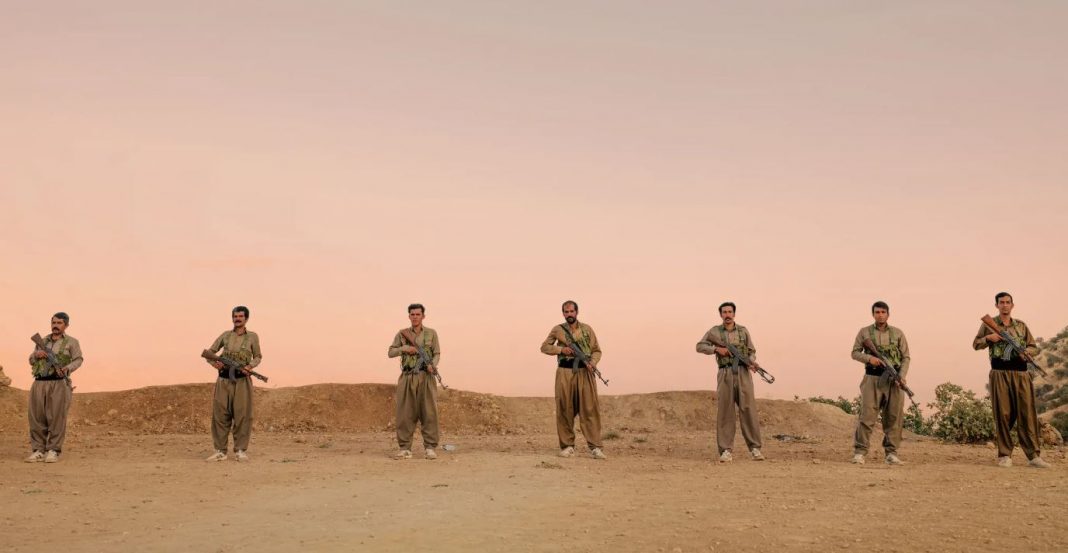On Monday, Iran carried out cross-border attacks using ballistic missiles and drones against Kurdish Iranian opposition bases in Iraq. The attacks resulted in the deaths of at least two people and the wounding of eight others. The attacks came after Iran issued what an Iranian official described as repeated warnings to Iraq to expel the groups.
On Monday, the semiofficial Fars news agency in Iran said that the country’s security services had used missiles and drones to target “terrorist organisations.” An Iranian commander also identified cities and villages that the Iranian military intended to assault in the near future.
Iran holds these organisations responsible for stoking the flames of unrest that have engulfed the country since since the murder of a young Kurdish-Iranian lady in detention in Iran after being suspected of breaking the ban on head coverings. The incident occurred in September.
According to the deputy head of the party, Amanj Zebaii, the Kurdistan Democratic Party of Iran reported that two of its members were killed and eight of its members were injured when Iranian Fateh-110 ballistic missiles struck the party’s main base near the city of Koya in Iraq’s semiautonomous Kurdistan Region. The incident occurred near the city of Koya. According to him, five of the organization’s most remote mountain outposts in the Sidakan region were also destroyed.
Komala, also known as the Iranian Kurdish Communist Party, is a prominent opposition organisation that has said that its base near Sulaimaniya was attacked on Monday morning. However, the opposition group did not report any injuries as a result of the assault. An officer from Komala named Navid Mehrawar said that there were five suicide drones that attacked the base.
The Kurdish media published footage of air-raid sirens wailing from the American embassy in the middle of Erbil, which is the capital of the Kurdish autonomous region. Residents of a neighbourhood in the city of Sulaimaniya, which is the second biggest city in the Kurdistan Region, have reported seeing Iranian surveillance drones flying above. Iranian authorities have accused this region of providing a safe haven for members of the opposition.
According to officials from the Kurdish health ministry, the attacks that took place on Monday were the first since Iranian forces carried out a series of strikes at the end of September that lasted for several days and resulted in the deaths of 18 people, including a pregnant woman, and injuries to nearly 60 others at and around opposition bases located all across the region.
A commander of the Iranian Republican Guard Corps named Brigadier General Mohammad Pakpour was cited by the Fars news agency as stating that Iran has asked in repeated meetings with Iraqi and Kurdish authorities that the opposition fighters be removed or disarmed.
Commander Pakpour, without providing any proof, blamed opposition groups in Iraq’s Kurdistan Region for assassinations that took place in mostly Kurdish provinces. He also claimed that the majority of protesters who were arrested were members of opposition groups based on the other side of the border. He went on to name nine other localities, neighbourhoods, and locations in the region that he said Iran intended to attack next if the people living in those places did not deport opposition members.
The leader of the opposition, Commander Pakpour, referred to the organisations as separatists. However, the organisations that have been attacked have made it very clear that they consider an independent Kurdish state to be a cherished but unreachable aspiration and that they are committed to bolstering Kurdish rights within the context of a democratic and federated Iran. The targeted organisations have said that they have not carried out any assaults inside Iran.
The Iraqi minister of foreign affairs, Fuad Hussein, referred to the strikes as a “hostile escalation” and said he had sent this message to the Iranian minister of foreign affairs on Monday. He claimed the attacks were hazardous and unjustifiable. Mr. Hussein has described the strikes as a flagrant breach of Iraqi national sovereignty. According to reports from Iraq’s Foreign Ministry, the nation is considering taking high-level diplomatic action in retaliation.
Mohammed Shia al-Sudani, the newly appointed Prime Minister of Iraq, said on Saturday to media in Baghdad that the leadership of the semiautonomous Kurdistan Region had rejected the disarmament proposal.
Several armed Kurdish opposition organisations in Iran have had bases in the adjoining Iraqi territory for a number of years now. They claim that the rifles and rocket-propelled grenades that make up the majority of their arsenal are for both self-defense and contributing to the defence of the Iraqi border.
After the Islamic State took control of sections of northern Iraq in 2014, one of these organisations, the P.A.K., became a component of the coalition of Kurdish forces supported by the United States that fought against the Islamic State.

